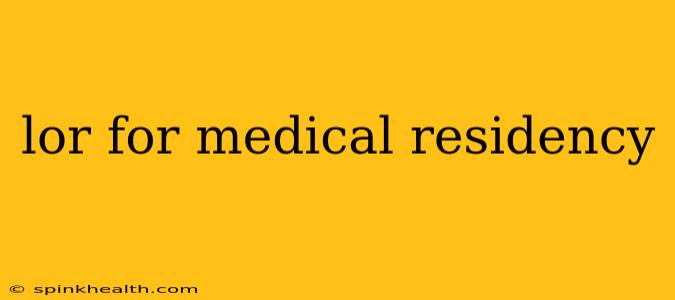The LOR for Medical Residency: Your Ticket to the Next Chapter
The letter of recommendation (LOR) for medical residency looms large in the minds of many graduating medical students. It's not just a formality; it's a crucial piece of your application puzzle, a powerful voice vouching for your suitability for a coveted residency position. This isn't just about grades and scores; it's about painting a vivid, compelling picture of you – the dedicated physician-in-training, ready to embark on the next stage of your career. Think of it as a meticulously crafted story, told by someone who knows you exceptionally well.
My own journey into medicine taught me the importance of strong LORs. Witnessing colleagues whose compelling narratives, expertly woven by their mentors, secured their dream residencies, fueled my understanding of their power. This isn't just about achieving a high score on Step 1 or acing your rotations—it's about showcasing the qualities that make you a truly exceptional candidate.
Let's delve into the key elements that make a medical residency LOR stand out.
What are the key components of a strong LOR for medical residency?
A truly effective LOR isn't simply a list of your accomplishments. It's a nuanced portrayal of your character, skills, and potential, supported by specific anecdotes and examples. It should:
-
Highlight your unique qualities: What makes you stand out from the crowd? Are you an exceptional communicator? A brilliant problem-solver? A compassionate caregiver? The letter should articulate these attributes with concrete evidence.
-
Showcase your clinical skills: Specific examples of your diagnostic abilities, clinical reasoning, and patient interaction are vital. Think of memorable cases where your skills shone through.
-
Demonstrate your professionalism and work ethic: LORs often highlight a candidate's reliability, dedication, and teamwork skills. Mention specific instances that showcase these qualities.
-
Address your weaknesses (if applicable): A truly honest and insightful LOR might briefly mention areas for improvement, followed by how you've addressed or are addressing them. This demonstrates self-awareness and a commitment to growth.
-
Go beyond the CV: The letter should expand on the information provided in your CV, offering a deeper understanding of your personality and motivations.
What are the different types of LORs for medical residency?
The types of LORs you need depend on your program's requirements, but commonly include:
-
Dean's letter: Usually a more general overview of your academic performance and achievements.
-
Letters from research mentors: If you have substantial research experience, these LORs highlight your scientific contributions and research aptitude.
-
Letters from clinical preceptors: These letters focus on your clinical skills, professionalism, and patient interaction. They're often considered the most influential.
How do I choose the right people to write my LORs?
Selecting your recommenders is a crucial decision. Choose individuals who know you well, have observed your strengths and weaknesses firsthand, and can write a compelling and persuasive letter on your behalf. Ideally, these are individuals who can speak to your abilities in various contexts—clinical, research, and leadership.
How long should a LOR be?
While there's no strict word count, most LORs are around one to two pages. Keep it concise and focused, ensuring every sentence adds value.
When should I ask for LORs?
Request letters well in advance of deadlines. This allows your recommenders ample time to write thoughtful and detailed letters. Give them your CV, personal statement, and a list of programs you're applying to.
The LOR for medical residency is far more than just a letter of support; it’s a carefully crafted narrative that paints a picture of your potential. By understanding its importance, carefully selecting your recommenders, and ensuring they have the necessary information, you’ll significantly enhance your chances of securing a spot in your chosen residency program. Remember, this is your story—let your recommenders tell it well.

